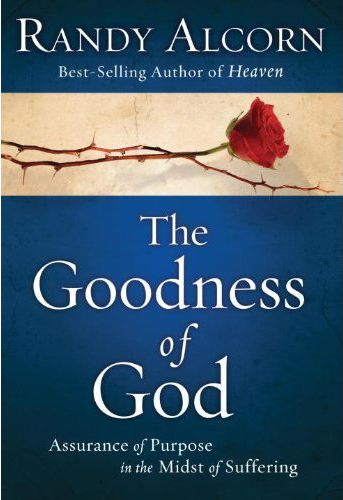Book Reviews of The Goodness of God
Ferguson (By Grace Alone) says in his book that one of Satan's tricks is to confuse us about God's character. Alcorn addresses that and other questions about suffering in this slender primer. He includes stories, but his approach is more propositional and will appeal to readers who want to study the subject systematically. He examines briefly the prosperity gospel, the role of suffering in God's redemptive plan, and alternative (Buddhist and other) explanations for evil and suffering. Alcorn writes that he found comfort in his search to find the answer to the question, Why is there suffering? He adds, "Genuine faith will be tested by suffering; false faith will be lost—the sooner, the better." — Susan Olasky, "Notable Books," World Magazine, October 9, 2010
I have read literally dozens of books which tackle the question of reconciling suffering and evil in the world with the existence of an all-powerful, all-loving, all-knowing God. This is undoubtedly one of the most fundamental questions any of us faces in our journey, and has been one of the biggest stumbling blocks of faith for countless people since time began.
I came at this book a bit skeptically, unsure that Alcorn's take on the subject would be worth my time. The book is small—only 115-some pages that are not large—and I was doubtful that such a huge and weighty subject could be adequately tackled with so few words. I was pleased to discover that my doubts were ill-founded. In these few, small pages, Alcorn has managed to distill the arguments and difficulties to their basic facets, addressing each with TRUTH in a simple, yet powerful way.
I don't think I'm exaggerating when I state that this book may well be the most important one many people can read, next to the Bible itself. The Body needs these truths: first, to answer our own questions and doubts. And secondly, to answer the cries of a hurting world. WHY does God allow evil and suffering in His world? Why do "bad things" happen to "good people"? Writing from the perspective of one who has himself had to grapple with these questions in personal, painful ways, Alcorn masterfully answers these questions with the truths of Scripture, using simple logic and fact to show that God really can be trusted.
The book is concise enough that any reader should be able to make it through without getting bogged down, yet it is remarkably comprehensive and does not brush aside any hard questions. The simplicity makes it a great resource for looking up answers, or to read with others for discussion and study. It is unquestionably one of the best books I have ever read on the topic, and I would recommend it most highly to anyone.
— ASourceOfJoy, as posted on amazon.com
I love the subtitle to the book, The Goodness of God: Assurance of Purpose in the Midst of Suffering. If you haven’t read Randy Alcorn’s books then this is a great time to start and you don’t even have to be going through a trial to read and glean from his books.
In true “Alcorn fashion,” Randy gently, but effectively, teaches through his writings about God’s goodness. I love chapter 7—“God’s Control and Our Freedom.” How many times do see those two words together?
Control AND Freedom? This chapter allowed me to “see” how letting God control my life brings freedom to me! Wonderful inspiration!
One of my mom’s favorite comebacks to people who ask, “Why me?” when something bad happens to them, is to respond with, “If we ask ‘Why me?’ when something unfortunate happens we also have to ask ‘Why me?’ when we are blessed above measure.” And that is what Randy Alcorn impresses me with in this book The Goodness of God.
Here’s a quote from page 65, “If you’ve lived long enough, if enough time has passed since some of those “worst things” happened to you, you’ll certainly find an overlap…Because God is both loving and sovereign. Our lists provided persuasive proof that while evil and suffering are not good, God can use them to accomplish immeasurable good.…We can trust that God has a purpose for whatever he does and whatever he permits.”
This book was a joy to read! Thanks, Randy Alcorn, for your insightful writings. — Anonymous reviewer for ReadersFavorite.com,
Have you or someone you loved experienced a dark valley of grief, inexplicable illness, or emotional despair that turned into a dark night of the soul? Where you begged God to stop the pain, heal the illness or, at the very least, provide hope in a devastating situation?
I’ve experienced that darkness where devout prayers go unanswered and negativity takes root, with thoughts like did God hear my prayer, see my tears, or does He even care? It’s in those dark times when doubt and fear collide with hope that faith is tested.
Randy Alcorn, bestselling author of Heaven, wrote The Goodness of God, a “specially focused condensation of If God is Good to equip readers to find God in the midst of pain and suffering. It’s a book of encouragement for times we doubt God answers prayer. But, it’s also a book about evil, sin and suffering.
The author begins with a Barna Research poll question: “If you could ask God only one question and you knew he would give you an answer, what would you ask?”
The most common response, “Why does God allow pain and suffering?”
Why indeed! Alcorn determines the origin of evil in chapter one, which he describes as—“anything that violates God’s moral will.” He explains how evil began with Satan’s rebellion, then the fallen angels, and finally Adam and Eve. In each case, they exalted themselves above God, in rebellion and disobedience, the root of evil.
His definition of evil is the opposite of good, with moral wrongdoing the primary evil. Primary evil is often followed by suffering which tests genuine faith, according to Alcorn.
Yet, modern churches fail to teach a “biblical theology of suffering” which leaves Christians unprepared for “life’s harsh realities.” Another problem that adds to Christians feeling entitled is prosperity teaching. The author writes, “Prosperity theology has poisoned the church and undermined our [Christians] ability to deal with evil and suffering.”
He also addresses God’s sovereignty and describes God as a loving Father who “has purpose in whatever He permits,” with “short-term evil” often accomplishing “long-term good.” He characterizes suffering as a “process” God uses to develop mature believers. He assures readers God doesn’t promote evil, He only permits evil. Or as Joni Eareckson Tada writes, “God permits what He hates to accomplish that which He loves.”
With pointed quotes and personal examples Alcorn encourages readers to learn the importance of perspective, persistence and prayer. Especially in times of discouragement and doubt he recommends the following attitudes and actions:
- Read Scripture and hold on to God’s promises
- Know that suffering ends.
- Anticipate eternity.
- Pray—“Do not be anxious about anything...” Philippians 4: 6—7
- Reach out to others who suffer, with your time, energy or money.
I’ve reviewed all of Alcorn’s books and without exception, his books encourage, enlighten, and provide a clear pathway to God’s heart for those who suffer and struggle with doubt and unbelief. This one, as all the others, particularly Heaven, is an eleven in a ten out of ten. — Gail Welborn, Seattle Christian Book Review Examiner
This review originally appeared on Seattle Christian Book Review, August 18, 2010.



